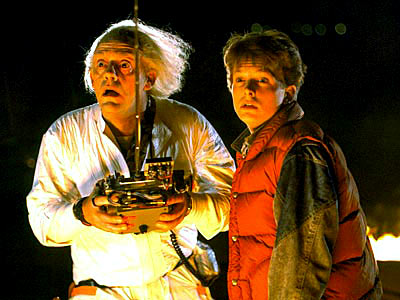"Jackson Browne and Copyright"
Comment (Permalink)
Kudos on bringing attention to this intriguing situation and providing plenty of robust contextualization to boot. In the case of Jackson Browne, I agree with your sentiment that opportunistic political agendas, rather than copyright issues, are at the heart of this dispute. There is no fundamental wrongdoing associated with Browne's protection of his intellectual property if allowed by current federal law, but again I find logic in your excoriation of the "double standard that separates
 printed media from audiovisual media" and the long, long highway that awaits art on its journey to the public domain (a concept that unfortunately seems on the verge of obsolescence). However, I would be curious to know where you stand regarding an artist's prerogative to protect the original intention of his or her work. As you mention, "intentions don't matter" whether you agree or disagree with the messages embedded in forms of popular culture and media. But in mediating how the work of musicians like Browne is absorbed and appropriated, do you mean to paint both spectator and artist with the same brush? Should the original thematic context of "Running On Empty," a song about 1970s Me Decade alienation, be at least noted if it is to be transformed into another type of propaganda? This imbroglio reminds me of the Reagan campaign's attempt to spin Bruce Springsteen's cynical "Born In the USA" into a sunny patriotic anthem in the 1984 presidential race until Springsteen spoke out against such a blatant misrepresentation of his artistic intentions. The gulf between Browne and McCain might not be as vast with regard to the campaign ad in question, but in many instances the exploitation of popular music by politicians is just as opportunistic and unseemly as Browne's grandstanding lawsuit. Nonetheless, I found your post a highly thought-provoking and well-researched object lesson about the continued limitations on the mutability of media in an ostensible age of access and choice.
printed media from audiovisual media" and the long, long highway that awaits art on its journey to the public domain (a concept that unfortunately seems on the verge of obsolescence). However, I would be curious to know where you stand regarding an artist's prerogative to protect the original intention of his or her work. As you mention, "intentions don't matter" whether you agree or disagree with the messages embedded in forms of popular culture and media. But in mediating how the work of musicians like Browne is absorbed and appropriated, do you mean to paint both spectator and artist with the same brush? Should the original thematic context of "Running On Empty," a song about 1970s Me Decade alienation, be at least noted if it is to be transformed into another type of propaganda? This imbroglio reminds me of the Reagan campaign's attempt to spin Bruce Springsteen's cynical "Born In the USA" into a sunny patriotic anthem in the 1984 presidential race until Springsteen spoke out against such a blatant misrepresentation of his artistic intentions. The gulf between Browne and McCain might not be as vast with regard to the campaign ad in question, but in many instances the exploitation of popular music by politicians is just as opportunistic and unseemly as Browne's grandstanding lawsuit. Nonetheless, I found your post a highly thought-provoking and well-researched object lesson about the continued limitations on the mutability of media in an ostensible age of access and choice."Obama to Release 'Yes We Can' Campaign Soundtrack"
Comment
Thank you for a brief but informative post saturated with information on the relationship of the current musical zeitgeist to the presidential campaign of Barack Obama. Having read recently about John McCain's difficulties in getting approval from Jackson Browne and Heart to use their songs in campaign materials, your post displays a fascinating polarity between the two candidates and the formation of their respective cultural images. Also, the brief concession to the Yes We Can: Voices of a Grassroots Movement "soundtrack" as perhaps another example of the media's fixation on Obama's "celebrity" is a rare combination of respect and lightheartedness. Your comment that the album "will be sold right up until Nov. 4 as a campaign fundraiser (and afterwords as a 'fundraiser' for record company Hidden Beach Recordings)" is a great reminder of the commercial and political agendas driving the appropriation
 of the music.
of the music.What intrigues me the most in this post, however, is the issue of semantics. Firstly, do you find any irony in the album's subtitle ("Voices of a Grassroots Movement")? The term "grassroots" gets thrown about by many politicians but often sounds like faux-populist pandering, though the publisher of the record could be more to blame in this case. However, with the album gaining the full endorsement of the Obama to the point where it can be found for sale on his campaign website, it behooves us to examine just who the "voices" of this movement are: highly successful and affluent musicians, such as John Mayer, Stevie Wonder, and Sheryl Crow. Additionally, I am curious to know what you make of the rather middle-of-the-road composition of the tracklist. Though the inclusion of Kanye West may help the endeavor strike a somewhat edgy posture, your allusions to independent musical endorsements from the likes of bawdy rapper Ludacris are likely to pique more attention from those outside the Starbucks-music demographic. At any rate, this is indeed "a new twist on raising money for a presidential campaign," vastly different from the now-obligatory classic rock campaign anthems and even 2004's Vote for Change tour that was more about arraying support against a candidate than for one; however, I personally doubt that Obama supporters are willing to pay a premium for an album that--at least after Election Day--literally undermines the familiar campaign lament of the rich getting richer.


